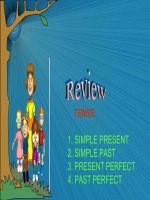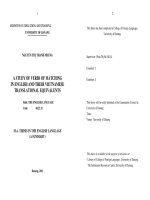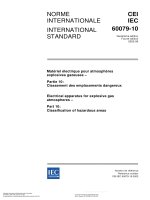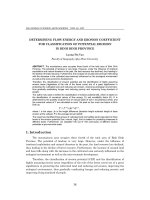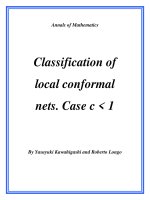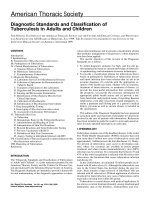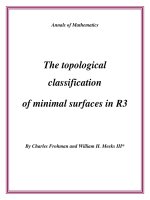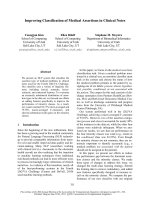Classification of verbs
Bạn đang xem bản rút gọn của tài liệu. Xem và tải ngay bản đầy đủ của tài liệu tại đây (9.5 KB, 2 trang )
Classification of verbs
Transitive and intransitive verbs
Verbs
can be classified in several ways. First, some verbs require an object to complete their meaning.
‘She read…’ Read what? ‘She read a story.’
These verbs that require an object are called
transitive verbs
. Verbs that do not require an object are called
intransitive verbs.
Note that most verbs can be both transitive and intransitive.
‘The ship sank.’ (Intransitive)
‘The explosion sank the ship.’ (Transitive)
Some verbs can take a
direct object
and an
indirect object.
These verbs are sometimes called
ditransitive
verbs
. Of course, this is not a term you will hear every day.
‘Loud music gives me a headache.’
In the example given above, the verb gives has two objects –
me
and
headache.
Finite and non-finite verbs
Verbs can also be classified as
finite
or
non-finite.
A finite verb
can be the main verb of the sentence. Its form is determined by the number and person of the
subject.
I
work
at a bank.
He
works
at a bank.
I
have worked
with children before.
She
has worked
with mentally challenged people.
Non-finite verbs
cannot be main verbs. There are mainly three types of non-finite verbs:
infinitives, gerunds
and
participles
.
Linking Verbs
A linking verb connects a subject with its complement. These verbs are often called
copular verbs
or
copulas.
Most linking verbs are forms of the verb
be.
She
is
my sister.
We
are
happy.
They
were
shocked to hear the news.
A few other verbs related to the five senses are also considered as linking verbs. Examples are:
look, feel,
sound, taste, smell
. Some stative verbs are also considered as copular verbs. Examples are:
appear, seem,
become, grow, turn, prove and remain
. Note that a linking verb should be followed by a noun or an adjective.
Students sometimes incorrectly use adverbs after linking verbs. This is a mistake.
She
looked happy.
(NOT She looked happily.)
The fish
smells awful
. (NOT The fish smells awfully.)
I
feel bad
. (NOT I feel badly.)
Be first to know when grammar rules change! Sign up to our newsletter here: englishgrammar.org (It's free)
Powered by TCPDF (www.tcpdf.org)


